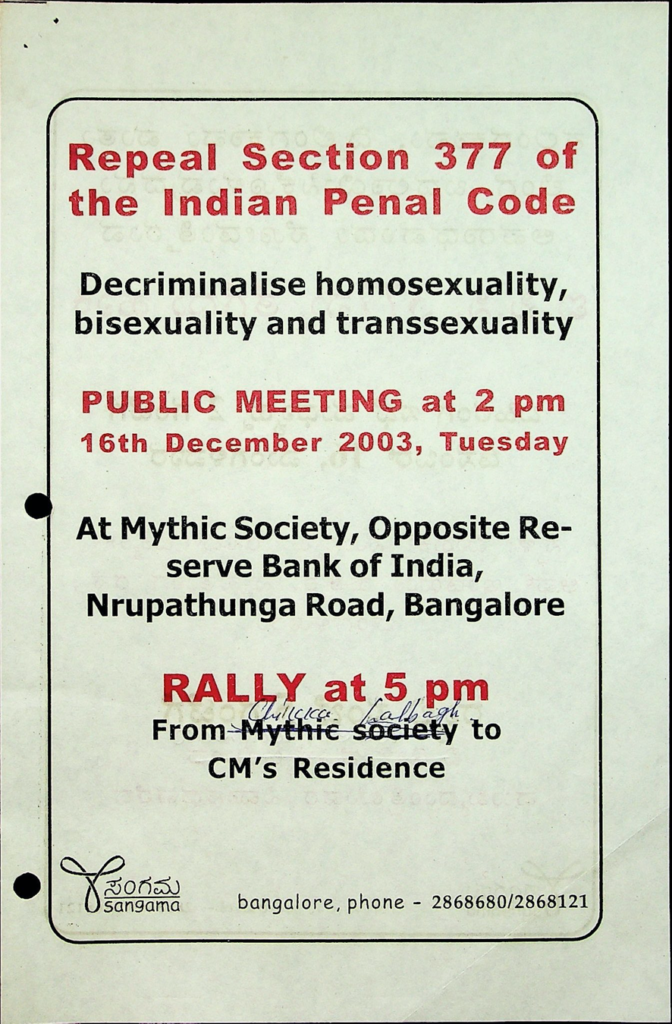Sangama is an organisation dedicated to protecting the rights of working class queer communities, sex workers and people living with HIV/AIDS (PLHA). Manohar Elavarthi established Sangama in Bangalore in 1999 when he was bestowed the MacArthur Fellowship. It was started as a resource and documentation centre on issues of gender and sexuality during a time when most Indian queers were afraid to come out publicly, and information on alternative sexual and gender identities was severely lacking.
Over the next few years, increasing interactions with the local queer communities of different classes informed Sangama’s evolution into a behemoth organisation involved in crisis intervention and HIV/AIDS prevention at the grassroots level while advancing the judicial battle against Sec 377 IPC. With the aim of empowering working class queer persons to lead the queer movement, Sangama created several Community Based Organisations (CBOs) such as Vividha, Samara, LesBiT, Sadhane, and Karnataka Sexual Minorities Forum.
This collection gives a broad view of the functioning of Sangama and its daughter CBOs, and describes the context in which the queer movement developed in the city. The collection is organised in the following series:
Manohar’s Material – before founding Sangama, Manohar had been a part of Khush Club and Khush Manch in Bombay; and, Good As You (GAY) and Sabrang in Bangalore. Documents from this phase reveal why he decided to create Sangama to be the space it was envisioned as. He was also collecting textual material relating to queer lives and queer groups/organisations in India and abroad from before 1999, which fed into Sangama’s Documentation Project.
Sangama Organisational – of Sangama and its daughter CBOs provide a glimpse at the inner machinery: what went into fuelling the projects launched by the organisations and sustaining a movement. This series consists of internal and staff documents, correspondence, organisational records, daily

reports by employees, posters and pamphlets from the events organised by Sangama, letters from other organisations inviting Sangama to engage with them, and documents from the various projects undertaken by Sangama. Also included in this series are ephemera (brochures, pamphlets, reports, posters, newsletters, surveys, stickers, booklets, cards, flags, fact sheets, programmes, and invitation cards from across the globe) and academic articles, mostly on gender, queer theory, and political theories collected by the organisation.
Sangama Documentation Project – from 1999 to around 2016, Sangama undertook a funded Documentation Project. Every day, a team was involved in cutting out articles from regional and national dailies, periodicals and magazines, and pasted them onto sheets of paper to create a bank of resource material on themes of gender, sexuality, human rights, violence, society, healthcare, HIV/AIDS, Commercial Sex Work, and culture. Publications from six Indian languages were chosen—Kannada, Tamil, English, Malayalam, Telugu and Hindi.
Crisis Intervention – ‘crisis intervention’ is a term borrowed from Sangama, which refers to the NGO’s involvement in providing emergency aid (legal aid, assistance at police stations, protection of individuals when necessary, human rights counsel) to queer individuals who find themselves in conflict with the state, police, society, family and other individuals. A mixture of public and private documents make up this collection, which includes FIRs, Witness Statements, Court Orders, Charge Sheets, Bail applications, letters to police personnel, Police Endorsements, hand written letters seeking aid addressed to NGOs, Medical Certificates, Legal Notices, and photos of concerned individuals.
Audio-visual – this series contains CDs, DVDs, Floppy Disks and hundreds of still images. This series is yet to be catalogued.